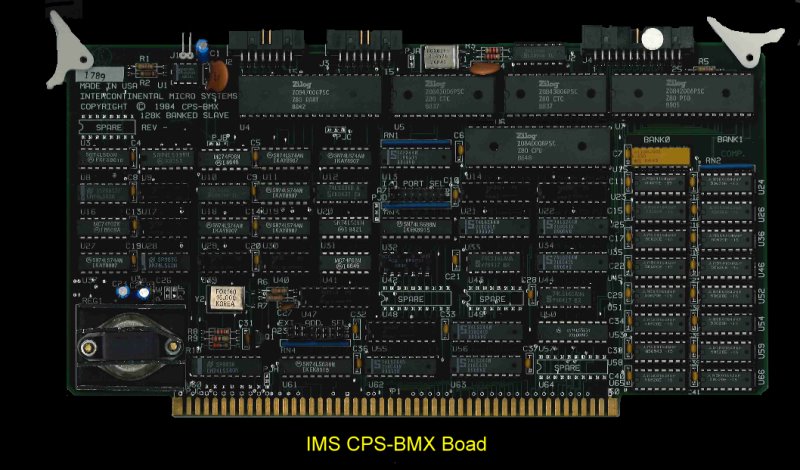The ICM
CPS-MX 64K SLAVE
AND CPS-BMX 128K SLAVE computers were very fast, reliable slave processors
compatible with ICM'S S-100 BUS master computer. Used in combination with
the ICM CPZ-4800X MASTER SBC, the CPS offers a high throughput, high
performance capability unmatched by any other master/slave combination
available in the S-100 market today.
The CPS was a Z80 based processor using either the Z80A, 4MHZ or Z80B, 6MHZ
architecture. It was in full compliance with the IEEE 696.1/D2 S-100 bus
standard. This slave processor could be used with any S-100 Z80A SBC with
extended address capability. It could also be used as an intelligent I/O
processor in a single user system or in a 16 bit architecture. The CPS
was offered with 64K RAM and 128K RAM options. The 128K board has been
designed specifically for TURBODOS 1.3 applications. TurboDOS 1.3 supports
128K bank-switched memory on Z80 computers, two banks of 64K RAM. One bank
holds the operating system and a large pool of disk buffers. Almost all of
the other bank (except the topmost 1K) was available of user programs. This
63K transient program area (TPA) give applications significantly more space
the on previous TurboDOS versions. Under TurboDOS 1.3, processing of console
I/O functions was now more that twice as fast as before. This results in
greatly improved performance with console-intensive applications such as
WordStar. The 64K board was compatible with CP/NET and TurboDOS 1.22 & 1.3.
Using the CPS in a DIRECT MEMORY ACCESS (DMA) mode, as available with the
CPZ master, resulted in memory transfer that is 300% faster than the
typical I/O mapped architecture. DMA relieved the master and slave CPU's of
memory allocation code, bypassing them completely to do memory transfers.
DMA also allowed memory transfer in 128 byte blocks rather than the standard
byte by byte transfer method.
The CPS can be used as a MEMORY MAPPED SLAVE using the MEMORY MANAGEMENT
UNIT (MMU) available on the IMS/ICM CPZ MASTER. A memory mapped slave was at
least twice as fast as a standard I/O mapped slave. Memory mapping also
eliminates expensive on-board hardware such as EPROM and FIFO buffers.
Memory mapping allowed the master to download the Operating System and
Application Software directly to the slave's memory eliminating the time and
protocol code usually required by both the master's and slave's CPU's.
OPERATING SYSTEM COMPATIBILITY: The CPS was been specifically designed to
operate under a TurboDOS OS. TurboDOS is compatible with virtually all
off-the-shelf CP/M APPLICATION SOFTWARE. Since CP/M had been the standard
8-bit Operating System for a number of years, there were literally THOUSANDS
of Application Software
Packages readily available.
The manual for this board can be obtained
here.


